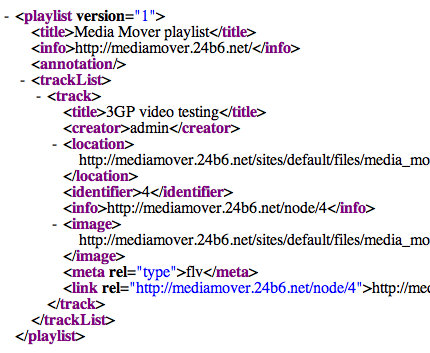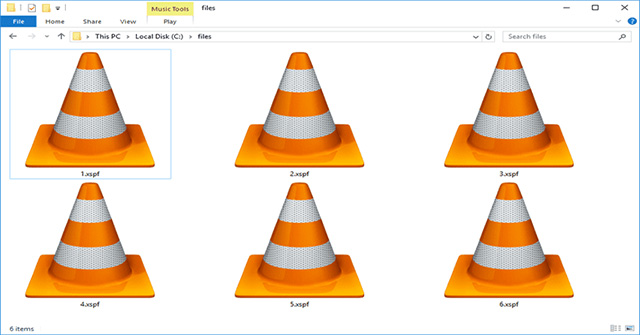| File type | XML Shareable Playlist Format |
| Developer | N/A |
| Ads |
What is a XSPF file?
Files with the .XSPF extension contain playlist data, i.e. a list of links to multimedia files saved in a standardized format based on XML – the XML Shareable Playlist Format. The file contains XML tags used to organize and list files contained in the playlist.
XSPF files are similar to M3U files. They do not contain data to be played back, only references to this data. For more information about the XSPF format, please visit XSPF.Org.
At first I didn't realize.XSPF file data structure is same as XML, so you can just load the.XSPF file instead of.XML into a document and do parsing. The MIME type for XSPF documents is application/xspf+xml. It is NOT text/plain, audio/xspf, or text/xml. XML Shareable Playlist Format (XSPF), pronounced 'spiff', is a next-generation playlist format for digital media such as songs in Vorbis or MP3 format. This wiki is for developers. The mime type for XSPF playlists is application/xspf+xml. Spec is at http://www.xspf.org/specs/.
- The xspf file extension is a data format for sharing the kind of playlist that can be played on a personal computer or portable device. In the same way that any user on any computer can open any web page, XSPF is intended to provide portability for playlists.
- An XSPF file is a playlist saved in the XML Shareable Playlist Format (XSPF). It is similar to a.M3U file, but uses standard XML tags to organize and list files included in the playlist. XSPF files are used by various audio players, such as VLC media player, AIMP, Clementine, and Audacious.
Program(s) that can open the .XSPF file
Mac OS
How to open XSPF files
If you cannot open the XSPF file on your computer - there may be several reasons. The first and most important reason (the most common) is the lack of a suitable software that supports XSPF among those that are installed on your device.
A very simple way to solve this problem is to find and download the appropriate application. The first part of the task has already been done – the software supporting the XSPF file can be found in the table. Now just download and install the appropriate application.
Possible problems with the XSPF format files

The inability to open and operate the XSPF file does not necessarily mean that you do not have an appropriate software installed on your computer. There may be other problems that also block our ability to operate the XML Shareable Playlist Format file. Below is a list of possible problems.
- Corruption of a XSPF file which is being opened
- Incorrect links to the XSPF file in registry entries.
- Accidental deletion of the description of the XSPF from the Windows registry
- Incomplete installation of an application that supports the XSPF format
- The XSPF file which is being opened is infected with an undesirable malware.
- The computer does not have enough hardware resources to cope with the opening of the XSPF file.
- Drivers of equipment used by the computer to open a XSPF file are out of date.
If you are sure that all of these reasons do not exist in your case (or have already been eliminated), the XSPF file should operate with your programs without any problem. If the problem with the XSPF file has not been solved, it may be due to the fact that in this case there is also another rare problem with the XSPF file. In this case, the only you can do is to ask for assistance of a professional staff.
Similar extensions
| .a2b | Adlib Tracker II Instrument Bank |
| .a2i | Adlib Tracker Instrument Format |
| .a2m | AdLib Tracker 2 Format |
| .a2p | Adlib Tracker Pattern Format |
| .a2t | Adlib Tracker Tiny Module Format |
| .aa | Audible Audio Format |
| .aa3 | Sony ATRAC Audio Format |
| .aac | Advanced Audio Coding Format |
How to associate the file with an installed software?
If you want to associate a file with a new program (e.g. my-file.XSPF) you have two ways to do it. The first and the easiest one is to right-click on the selected XSPF file. From the drop-down menu select 'Choose default program', then click 'Browse' and find the desired program. The whole operation must be confirmed by clicking OK. The second and more difficult to do is associate the XSPF file extension to the corresponding software in the Windows Registry.
Is there one way to open unknown files?
Many files contain only simple text data. It is possible that while opening unknown files (e.g. XSPF) with a simple text editor like Windows Notepad will allow us to see some of the data encoded in the file. This method allows you to preview the contents of many files, but probably not in such a structure as a program dedicated to support them.
| Filename extension | |
|---|---|
| Internet media type | application/xspf+xml |
| Developed by | Xiph.Org Foundation |
| Type of format | Playlist |
| Extended from | XML |
XML Shareable Playlist Format (XSPF), pronounced spiff,[1] is an XML-based playlist format for digital media, sponsored by the Xiph.Org Foundation.
XSPF is a file format for sharing the kind of playlist that can be played on a personal computer or portable device. In the same way that any user on any computer can open any Web page, XSPF is intended to provide portability for playlists.
Content resolution[edit]
Traditionally playlists have been composed of file paths that pointed to individual titles. This allowed a playlist to be played locally on one machine or shared if the listed file paths were URLs accessible to more than one machine (e.g., on the Web). XSPF's meta-data rich open format has permitted a new kind of playlist sharing called content resolution.
A simple form of content resolution is the localisation of a playlist based on metadata. An XSPF-compliant content resolver will open XSPF playlists and search a catalog for every title with <creator>, <album> and <title> tags, then localise the playlist to reference the available matching tracks. A catalog may reference a collection of media files on a local disk, a music subscription service like Yahoo! Music Unlimited, or some other searchable archive. The end result is shareable playlists that are not tied to a specific collection or service.
Example of an XSPF 1.0 playlist[edit]

History[edit]
XSPF was created by an ad hoc working group that commenced activities in February 2004, achieved rough consensus on version 0 in April 2004, worked on implementations and fine tuning throughout summer and fall 2004, and declared the tuned version to be version 1 in January 2005.
XSPF is not a recommendation of any standards body besides the Xiph.Org Foundation.
Features[edit]

- A playlist format like M3U or ASX
- MIME content-type of application/xspf+xml
- Patent-free (no patents by the primary authors)
- Specification under the Creative Commons Attribution-NoDerivs 2.5 license
- XML, like Atom
- Unicode support
- Cross-platform support
Software and web playlist converters[edit]
- VLC media player (stand-alone player, available on every major platform)
- XMMS2 (has a plugin to parse XSPF)
- Last.fm (export of playlists and personal tag radios in XSPF)
- Soundiiz (playlist converter for several streaming sites) -Soundiiz
See also[edit]
- Other playlist file formats
How To Convert Xspf To Mp4
- ASX - Windows media
- M3U - The most common playlist format
- PLS - SHOUTcast
- WPL - Windows Media Player
References[edit]
- ^'XSPF: XML Shareable Playlist Format: Quick Start'. Retrieved 2009-04-23.
Xspf File Type
External links[edit]
- XSPF Version 1 specification.